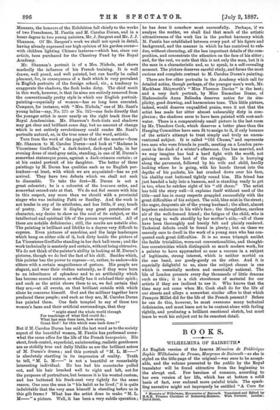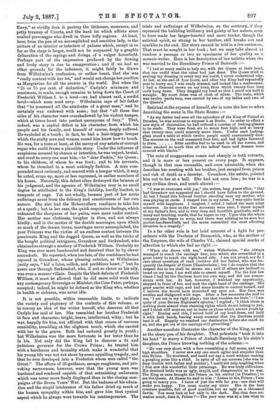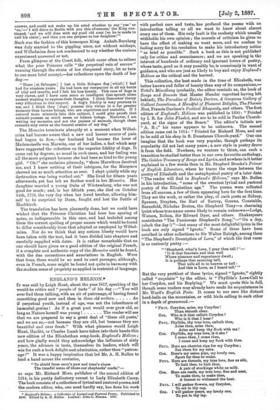BOOKS.
WILHELI/INA OF BAIREIITH.• _
AN English version of the famous Memoires de Priderique Sophie WiZheitnine de Prime, Margrave de Baireugh —so she is styled on the title-page of the original—was sure to be accept- able, and the volume presented to the public by the Royal translator will be found attractive from the beginning to the abrupt end. Few heroines of romance, according to her own version of her life, which has at bottom a solid- basis of fact, ever endured more painful trials. The spark- ling narrative might not improperly be entitled "A Cure for • Memoirs of Wilhelmine, Margroolne of Mainsail,. Trawls/Ad and Edited by H.E.H. Prinoem Christian of Schleswig-Holstein. With Portrait. London David Stott. Envy," so vividly does it portray the littleness, meanness, and petty tyranny of Courts, and the hard lot which afflicts some exalted personages who dwell in these lofty regions. At least, here, from the pen of an accomplished and sensitive lady, is the picture of an interior or interiors of palaces which, except in so far as the stage is larger, could not be surpassed by a graphic delineation of the sayings and doings of a vulgar household. Perhaps part of the impression produced by the flowing and lively story is due to exaggeration ; and if we had no other grounds for the inference, it might fairly be drawn from Wilhelmina's confession, or rather boast, that she was "really content with her lot," and would not change her position as Margravine for all the crowns in the world. But when the " 25 or 75 per cent. of deduction," Carlyle's minimum and maximum, is made, enough remains to bring down the Court of Frederick William I. to a level—we had almost said, a sordid level—which none need envy. Wilhelmina says of her father that " he possessed all the attributes of a great man," and he certainly was endowed with some; but that "all these fine sides of his character were overshadowed by his violent temper, which at times buret into perfect paroxysms of fury." That, indeed, was a capital defect in his character froM which his people and his family, and himself of course, deeply suffered. He exploded at a touch ; in fact, he had a hair-trigger temper which the Drafty men and women round him knew how to touch. He was, for a time at least, at the mercy of any astute or corrupt rogue who could frame a plausible story. Under the influence of suspicions aroused by chance or intention, he was unjust, brutal, and cruel to every one near him,—to " dear Feekin," his Queen ; to his children, of whom he was fond ; and to his servants, whom he thrashed in a most unkingly fashion. A man com- pounded most curiously, and marred with a temper which, it may be noted, crops up, more or lees repressed, in earlier members of his house. Naturally, this defect often destroyed the balance of his judgment, and the agonies of Wilhelmina may in no small degree be attributed to the King's liability, hardly limited, to tempests of rage. Yet not wholly, because part of her acute sufferings arose from the delicacy and sensitiveness of her own nature. She also had the Hohenzollern readiness to take fire at a spark ; but in her case, the quick responsive feelings, which enhanced the sharpness of her pains, were more under control. Her mother was obstinate, tougher in fibre, and not always kindly; and in the matter of the double marriages, upon which so much of the drama turns, marriages never accomplished, the poor Princess was the victim of an endless contest between the passionate King and the dogged Queen, as well as the tricks of the bought political intriguers, Grumkow and Seckendorf, who obtained so strange a mastery of Frederick William. Probably no King was ever more bamboozled and deceived than he by clever scoundrels. He repented, when too late, of the confidence he had reposed in Grumkow, whose pleasing exterior, as Wilhelmina justly says, "hid a false, selfish, and perfidious heart ;" but he never saw through Seckendorf, who, if not so clever as his ally, was even a meaner villain. Despite the black defects of Frederick William, it must be allowed that he did more solid work than any contemporary Sovereign or Minister, the Czar Peter, perhaps, excepted; indeed, he might be defined as the King who, whether in health or sickness, was never idle.
It is not possible, within reasonable limits, to indicate the variety and piquancy of the contents of this volume, or to convey an idea of the writer herself, who deserves all that Carlyle has said of her. She resembled her brother Frederick in face and character, bright, brave, intellectual, witty ; but he was, happily for him, not afflicted with that excess of nervous sensibility, trembling at the slightest touch, which she carried with her to the grave. Both had endured greatly in youth ; but Wilhelmina was the more fortunate in her tutor than he in his. Not only did the King fail to discover a fit and judicious governor for the Crown Prince; he treated him with a harshness and brutality which make it wonderful that his young life was not cut short by some appalling tragedy, and that he ever developed into a Frederick whom men called "the Great." The effects of ill-guidance, savage roughness, and pro- voking narrowness, however, were that the young man was hardened and rendered capable of that astonishing endurance which was never more finely displayed than in the closing cam- paigns of the Seven Years' War. But the badness of his educa- tion and the stupid intolerance of his father dried up much of the human sympathy within him, and gave him that cynical aspect which he always wore towards his contemporaries. The
trials and sufferings of Wilhelmina, on the contrary, if they repressed the bubbling brilliancy and gaiety of her nature, seem to have made her larger-hearted and more tender, though the satirical spirit, so strong in her brother, still breaks out and sparkles to the end. Her story cannot be told in a few sentences. That must be sought in her book ; but we may take almost at random a passage or two as specimens of her quality as a memoir-writer. Here is her description of her toilette when she was married to the Hereditary Prince of Baireuth " I had so many maids to help me, with the Queen at their head, that one undid what the other had just done. The Queen tried to prolong my dressing in every way she could, I never understood why. At last, at the end of four hours, and after the King had repeatedly sent to hurry me, I was ready dressed, and looked like a madwoman. I had a diamond crown on my head, from which twenty-four long earls hang down. They dragged my head so that I could not hold it straight. My court dress was of cloth of silver. The train, which was twelve yards long, was oarried by two of my ladies and two of the Queen's."
Satirical at the expense of herself, she is none the lees so when describing the scene in the State Rooms :— " As my father had seen all the splendour of the King of Poland at Dresden, be was anxious to surpass it at Berlin. In order to effect a new style of decoration, he had ordered a number of looking-glasses to be made. They were from six to seven feet high, and so heavy that twenty men could scarcely move them. Under each looking- glass stood a table at which twelve people could conveniently dine. The sconces on the wall measured four feet, and had lights fastened to them Altar candles had to be used in all the rooms, and these smoked so much that all the ladies' faces and dresses were covered with blacks."
The note of exaggeration comes out sharply in both extracts, and it is more or less present on every page. It appears, though in that case excusable, and even admirable, when she describes her meeting with her brother, jest escaped from prison and risk of death as a deserter. Grumkow, the astute, pointed him out to her at a ball. She had not seen him; he was in a gray civilian dress, and much altered :— " I was so overcome with joy," she writes, long years after, " that 'had Grumkow not supported me I should have fallen to the ground. At last I found this beloved brother standing near my mother, who was playing at cards. I clasped him in my arms. I was quite beside myself with happiness. I laughed, I cried, I talked the most utter nonsense. As soon as the first moments were over, I threw myself at my father's feet, and in very deep and heartfelt gratitude, said so many and touching words, that he began to cry. Upon this the whole company also began to weep, and there was nothing to be seen but pocket-handkerchiefs, and the scene resembled the most affecting situation in a tragedy."
In a far other vein is her brief account of a fight for pre- cedence with the Duchess of Brunswick, who, as the mother of the Empress, the wife of Charles VI., claimed special marks of attention to which she had no right :—
"When she drove with me," writes Wilhelmina, "she always managed to reach the carriage first, into which she scrambled in a great hurry to reach the right-hand side. I am not proud, nor do I care about questions of rank [neither did her father, who was fre- quently the despair of Court Chamberlains], but I do require that the respect due to me shall be shown me ; and if others are inclined to tread on my toes, I am well able to assert. myself. For the first few times I had let the Duchess have her own way, and did not remon- strate with her. At last, however, I watched my opportunity, stepped in front of her, and took the right-hand of the carriage. She grew scarlet with rage, and had some trouble to control herself, and I believe she would have scratched my eyes out. Her face was swollen and disfigured with rage. After a few moments she said to me, ' I am not in my right place ; but that troubles me little.'—' I am quite of your Serene Highness's opinion,' I replied ; 'I think there is nothing more absurd than claiming rights which do not belong to you, and I think still more so, not to insist on those which are not yours by right.' Having said this, I seized hold of my bead-dress, and held it with both hands, fearing every moment that the Duchess would tear it off. Happily we reached our destination before she could do so, and she got out of the carriage still grumbling."
Another anecdote illustrates the character of the King, as well as the sharp pen of his daughter. That potentate "took it into his head " to marry a Prince of Anhalt-Bernberg to his sister's daughter, the Prince knowing nothing of the scheme :— " He was very short, with a face resembling a full moon, and very high shoulders. I never saw any one much uglier and stupider than this Prince. He stuttered, and could not say a word without making a gurgling noise like a child. In spite of all my sorrows [she was in deep trouble with father and mother], I could not help laughing when I first saw this wonderful little personage. He was truly ridiculous. His destined bride was as ugly, stupid, and disagreeable as he was. The King at once brought the Prince on his arrival [at Potsdam]. to see the Queen. At dinner he said to him : ' Listen to me, Prince ; I am going to marry you. I know of just the wife for you : one that will make you happy. You must marry my niece. She is the best creature possible, fall of good qualities, but as ugly as a thousand devils. You must look at her only in the dark. But that does not matter much, does it, Prince F—The poor man was at a loss what to
answer, and could not make up his mind whether to say yes' or 'no.'—' I will drive to Berlin with you this afternoon,' the King con. tinned, 'and we will dine with my good old aunt [so he is made to -call his sister], and then you can propose to her daughter.'"
Such was the fashion of this homespun King. Anhalt-Bernberg was duly married to the giggling niece, not without mishaps, and Wilhelmina does not condescend to say whether the curious experiment answered or not. From glimpses of the Court folk, which occur often to relieve what the poor Princess calls "the the perpetual vein of sorrow" running through the strata of her chequered story, let us turn to one more brief excerpt,—ber reflections upon the death of her dog :—
" There [at Erlangen] I loot a little Bologna dog [which] I had had for nineteen years. He had been my companion in all my hours of trial and trouble, and I felt his loss keenly. This race of dogs is very clever, and I have seen some so intelligent that speech alone seemed wanting to express their thoughts. I think Descartes theory very ridiculous in this respect. A dog's fidelity is very precious to me, and I think they [dogs] possess this virtue in a far greater measure than human beings, who are capricious and unstable. If I -entered more minutely into this subject, I could give proofs that animals pumas as much sense as human beings. However, I am writing my memoirs, and not the praises of animals, though these remarks may serve as the funeral oration of my dog."
The Memoirs terminate abruptly at a moment when Wilhel- mina had become aware that a new and keener source of pain had began to flow,—her husband had become the lover of Mademoiselle von Marwitz, one of her ladies, a fact which may have suggested the reflection on the superior fidelity of dogs. It came out by degrees, as usual in such cases, and her feeling was all the more poignant because she had been so kind to the young girl. " Oh !" she exclaims piteously, " those Marwitzes deceived me, and I knew nothing of their intrigues, for the Margrave -showed me as much attention as ever. I slept quietly while my destruction was being worked oat." She lived for fifteen years afterwards, yet has left no farther word in her Memoirs. Her daughter married a young Duke of Wiirtemberg, who was not good for much ; and, in her fiftieth year, she died on October 14th, 1758, the very day when her loved brother, allowing him- self to be surprised by Dann, fought and lost the Battle of Hochkirch.
The translation has been pleasantly done, but we could have wished that the Princess Christian had been less sparing of notes, so indispensable in this case, and had included among them the correct spelling of proper names which would be found to differ considerably from that adopted or employed by Wilhel- InMa. Nor do we think that any serious liberty would have been taken with the text, had it been divided into chapters and -carefully supplied with dates. It is rather remarkable that no one should have given us a good edition of the original French, if a complete and authentic copy of the Memoirs could be found, with the due corrections and annotations in English. Were that done, there would be no need to omit passages, although, even in French, some might be found not quite in harmony with the modern sense of propriety as applied in restraint of language.




































 Previous page
Previous page